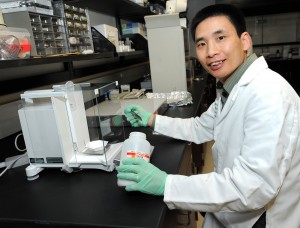Marshall University faculty members and students have been awarded 13 grants totaling $107,000 for aerospace-related research and educational programs.
The grants from the NASA West Virginia Space Grant Consortium support projects of scientific interest to NASA. The projects funded at Marshall range from a study to explore how obesity affects bone health to a grassroots outreach program showcasing 3-D printing technology.
The awards fall into five categories. Faculty members and students who received grants are listed below, along with the titles of their projects and the amount of each award.
Research Seed Grants to support faculty efforts to start research activities, conduct pilot experiments or demonstrate new concepts:
Dr. Nalini Santanam, Joan C. Edwards School of Medicine, “Omega 3 diet and microgravity regulates microRNA in adipocytes,” $10,000
Dr. Nicole Winston, School of Pharmacy, “Effects of cerium oxide nanoparticles on X-ray irradiated human keratinocytes,” $10,000
Dr. Miaozong Wu, School of Pharmacy, “Obesity-induced alteration of bone structure and function: molecular mechanisms and DMSO intervention,” $10,000
NASA Graduate Research Fellowship Program for graduate students working on a thesis or dissertation:
Benjamin Owen, biomedical sciences program (Dr. Lawrence Grover, mentor), “Role of Kv7 channels in controlling neuronal excitability,” $12,000
Lyndsay Rankin, biological sciences program (Dr. Anne Axel, mentor), “Using remote sensing to measure the ecological integrity of non-intact tropical dry forests of southern Madagascar,” $12,000
Rounak Nande, biomedical sciences program (Dr. Pier Paolo Claudio, mentor), “Ultrasound mediated gene delivery in immune-competent mice,” $12,000
M. Allison Wolf, biomedical sciences program (Dr. Pier Paolo Claudio, mentor), “Investigation of benzyl isothiocyanates regulation of metastatic processes in HNSCC cell lines,” $12,000
NASA Undergraduate Research Fellowship Program to provide support for undergraduate students involved in a research project under the supervision of a faculty mentor:
Zachary Hunter, chemistry and applied mathematics major (Dr. Scott Day, mentor), “Probe Density and Capture Efficiency Dependence on Dendrimer Size,” $5,000
Melissa Massie, biology major (Dr. Nalini Santanam, mentor), “Effect of omega 3 fat diet on obesity in antioxidant mice,” $5,000
Brianna Mayfield, biotechnology major (Dr. Elizabeth Murray, mentor), “Cell Culture Bioassay Development for Prymnesium parvum Toxins,” $4,000
Jenna Vance, exercise science major (Dr. Maria Serrat, mentor), “Unilateral Heating: A Novel Model to Induce Differential Extremity Growth in Mice,” $5,000
College Course Development Program for projects to develop new and innovative science and engineering courses:
Dr. Venkat Gudivada, College of Information Technology and Engineering, “Exploring the World with Computing,” $5,000
Extension and Public Outreach Program for projects to involve the public in the excitement of scientific discovery, emphasize the importance of science and engineering education, and bring the vision for space exploration to the grassroots level:
Tom Minnich, Robert C. Byrd Institute for Advanced Flexible Manufacturing, “3-D Printing Roadshow for NASA Outreach,” $5,000
The NASA West Virginia Space Grant Consortium includes 12 West Virginia colleges and universities and five corporate and scientific partners under the sponsorship of NASA. Members of the consortium are dedicated to enhancing the state’s competitiveness in aerospace research, education and industrial activities.









